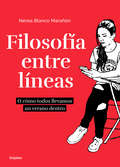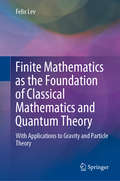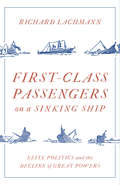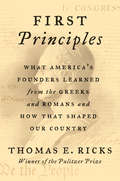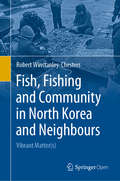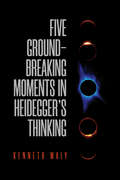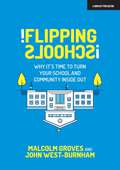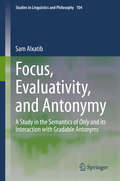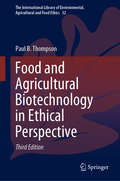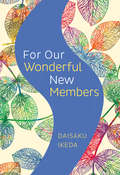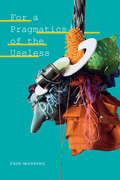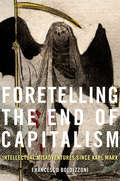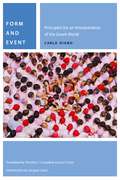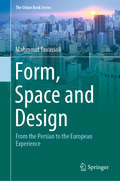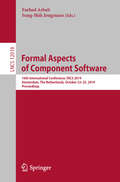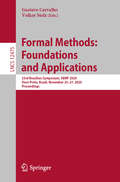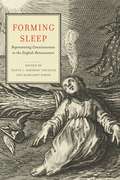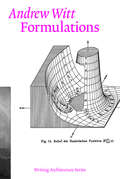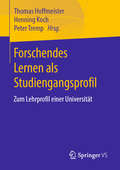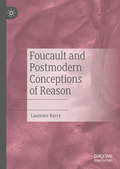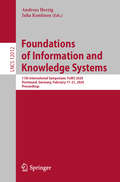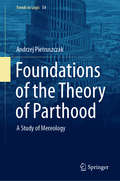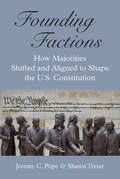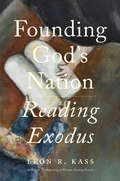- Table View
- List View
Filosofía entre líneas: O cómo todos llevamos un verano dentro
by Nerea Blanco MarañonRelatos de filosofía para la vida real. La filosofía está entre las líneas de esta historia tal y como lo está entre nuestros días, en las situaciones más cotidianas, oculta y a la vez a la vista de todos. Nos acompaña desde que nos levantamos con Sartre un lunes por la mañana hasta que gritamos embriagados en un concierto abrazados a la idea del Superhombre de Nietzsche. Este libro descodifica las emociones, miedos y esperanzas de los habitantes del siglo XXI. Nos hace entender nuestro presente y nuestra vida a través del pensamiento crítico. Se trata de un texto afilado, reivindicativo y feminista a ritmo de rock and roll. No es un disco, ni un ensayo, ni una novela, ni una autobiografía, aunque al mismo tiempo es, en realidad, un poco de todo esto. Se tenía que decir y se dijo: la filosofía is not dead.
Finite Mathematics as the Foundation of Classical Mathematics and Quantum Theory: With Applications to Gravity and Particle Theory
by Felix LevThis book delves into finite mathematics and its application in physics, particularly quantum theory. It is shown that quantum theory based on finite mathematics is more general than standard quantum theory, whilst finite mathematics is itself more general than standard mathematics.As a consequence, the mathematics describing nature at the most fundamental level involves only a finite number of numbers while the notions of limit, infinite/infinitesimal and continuity are needed only in calculations that describe nature approximately. It is also shown that the concepts of particle and antiparticle are likewise approximate notions, valid only in special situations, and that the electric charge and baryon- and lepton quantum numbers can be only approximately conserved.
First Class Passengers on a Sinking Ship: Elite Politics and the Decline of Great Powers
by Richard LachmannA history of why great powers decline, from Spain to the United StatesThe extent and irreversibility of US decline is becoming ever more obvious as America loses war after war and as one industry after another loses its technological edge. Lachmann explains why the United States will not be able to sustain its global dominance, and contrasts America's relatively brief period of hegemony with the Netherlands' similarly short primacy and Britain's far longer era of leadership.Decline in all those cases was not inevitable and did not respond to global capitalist cycles. Rather, decline is the product of elites' success in grabbing control over resources and governmental powers. Not only are ordinary people harmed, but also capitalists become increasingly unable to coordinate their interests and adopt policies and make investments necessary to counter economic and geopolitical competitors elsewhere in the world.Conflicts among elites and challenges by non-elites determine the timing and mold the contours of decline. Lachmann traces the transformation of US politics from an era of elite consensus to present-day paralysis combined with neoliberal plunder, explains the paradox of an American military with an unprecedented technological edge unable to subdue even the weakest enemies, and the consequences of finance's cannibalization of the US economy.
First Principles: What America's Founders Learned from the Greeks and Romans and How That Shaped Our Country
by Thomas E. RicksThe Pulitzer Prize-winning journalist and #1 New York Times bestselling author offers a revelatory new book about the founding fathers, examining their educations and, in particular, their devotion to the ancient Greek and Roman classics—and how that influence would shape their ideals and the new American nation. <p><p> On the morning after the 2016 presidential election, Thomas Ricks awoke with a few questions on his mind: What kind of nation did we now have? Is it what was designed or intended by the nation’s founders? Trying to get as close to the source as he could, Ricks decided to go back and read the philosophy and literature that shaped the founders’ thinking, and the letters they wrote to each other debating these crucial works—among them the Iliad, Plutarch’s Lives, and the works of Xenophon, Epicurus, Aristotle, Cato, and Cicero. For though much attention has been paid the influence of English political philosophers, like John Locke, closer to their own era, the founders were far more immersed in the literature of the ancient world. <p> The first four American presidents came to their classical knowledge differently. Washington absorbed it mainly from the elite culture of his day; Adams from the laws and rhetoric of Rome; Jefferson immersed himself in classical philosophy, especially Epicureanism; and Madison, both a groundbreaking researcher and a deft politician, spent years studying the ancient world like a political scientist. Each of their experiences, and distinctive learning, played an essential role in the formation of the United States. In examining how and what they studied, looking at them in the unusual light of the classical world, Ricks is able to draw arresting and fresh portraits of men we thought we knew. <p> First Principles follows these four members of the Revolutionary generation from their youths to their adult lives, as they grappled with questions of independence, and forming and keeping a new nation. In doing so, Ricks interprets not only the effect of the ancient world on each man, and how that shaped our constitution and government, but offers startling new insights into these legendary leaders. <p> <b>A New York Times Bestseller</b>
Fish, Fishing and Community in North Korea and Neighbours: Vibrant Matter(s)
by Robert Winstanley-ChestersThis open access book explores the histories and geographies of fishing in North Korea and the surrounding nations. With the ideological and environmental history of North Korea in mind, the book examines the complex interactions between local communities, fish themselves, wider ecosystems and the politics of Pyongyang through the lens of critical geography, fisheries statistics and management science as well as North Korean and more generally Korean and East Asian studies. There is increasing global interest in North Korea, its politics, people and landscapes, and as such, this book describes encounters with North Korean fishing communities, as well as unusual moments in the field in the People’s Republic of China, the Russian Federation and the Republic of Korea (South Korea). It addresses fish, fishing infrastructure, fishing science and fishing statistics and other non-human elements of North Korean and other nations’ developmental regimes as actors and participants within them as much as humans and their technologies. The book enables readers to gain extensive insights into the aspirations and practices of fishing in North Korea and its neighbours, the navigation of difficult political and developmental situations and changing ecological realities in a time of environmental and climate crisis familiar to many across the globe.
Five Ground-Breaking Moments in Heidegger’s Thinking (New Studies in Phenomenology and Hermeneutics)
by Kenneth MalyFive Groundbreaking Moments in Heidegger’s Thinking presents a fresh interpretation of some of Heidegger’s most difficult but important works, including his second major work, Beiträge zur Philosophie (Vom Ereignis) [Contributions to Philosophy (From Enowning)]. The careful approach shows how, for Heidegger, the acts of reading, thinking, and saying all move beyond the theoretical/conceptual and become an ongoing experience. In new translations of central texts, Kenneth Maly invites the reader to think along the way by reading, contemplating, and translating Heidegger’s ideas into this context. An introduction to the field of philosophy and more specifically to Heidegger’s thought, Five Groundbreaking Moments in Heidegger’s Thinking asks the reader, in some manner, to actively engage in thinking.
Flipping Schools: Why it's time to turn your school and community inside out
by Malcolm Groves John West BurnhamThis brilliant book, focused on the education of the most vulnerable and disadvantaged children, offers a radical critique of traditional approaches to school improvement. The text argues for a movement away from the focus on social mobility to placing equity at the heart of school leadership. It suggests moving from improvement to social justice through a re-examination of the school's role in relation to its communities. The book is evidence-based and combines a focus on moral leadership with strategies to turn principle into practice.
Flipping Schools: Why it's time to turn your school and community inside out
by Malcolm Groves John West BurnhamThis brilliant book, focused on the education of the most vulnerable and disadvantaged children, offers a radical critique of traditional approaches to school improvement. The text argues for a movement away from the focus on social mobility to placing equity at the heart of school leadership. It suggests moving from improvement to social justice through a re-examination of the school's role in relation to its communities. The book is evidence-based and combines a focus on moral leadership with strategies to turn principle into practice.
Focus, Evaluativity, and Antonymy: A Study in the Semantics of Only and its Interaction with Gradable Antonyms (Studies in Linguistics and Philosophy #104)
by Sam AlxatibThis book uncovers properties of focus association with 'only' by examining the interaction between the particle and bare (or “evaluative”) gradable terms. Its empirical building blocks are paradigms involving upward-scalar terms like 'few' and 'rarely', and their downward-scalar antonyms 'many' and 'frequently', an area that has not been studied previously in the literature. The empirical claim is that associations of the former type give rise to unexpected readings, and the proposed theoretical explanation draws on the properties of the latter type of association. In presenting the details, the book deconstructs the so-called scalar presupposition of 'only' and derives it from constraints against its vacuous use. This view is then combined with a semantics of the evaluative adjectives 'many' and 'few' to explain why the unavailable (but expected) meanings of the given constructions are unavailable. The attested (but unexpected) readings of 'only+few/rarely' associations are derived from independently motivated LFs in which the degree expressions are existentially closed. Finally, the book provides new findings, based on the core proposal, about 'only if' constructions, and about the interaction between 'only' and other upward-scalar modified numerals (comparatives, and 'at most'). The book thus provides new data and a new theoretical view of the semantic properties of 'only', and connects it to the semantics of gradable expressions.
Food and Agricultural Biotechnology in Ethical Perspective (The International Library of Environmental, Agricultural and Food Ethics #32)
by Paul B. ThompsonThis 3rd edition of Food and Agricultural Biotechnology in Ethical Perspective updates Thompson’s analysis to reflect the next generation of biotechnology, including synthetic biology, gene editing and gene drives. The first two editions of this book, published as Food Biotechnology in Ethical Perspective in 1997 and 2007, were the first comprehensive philosophical studies of genetic engineering applied to food systems. The book is structured with chapter length treatments of risk in four categories: food safety, to animals, to the environment and socio-economic risks. These chapters are preceded by two chapters providing orientation to the uses of gene technology in food and agriculture, and to the goals, methods and background assumptions of technological ethics. There is also a chapter covering all four types of risk as applied to the first US technology, recombinant bovine somatotropin. The last four chapters take up 1) intellectual property debates, 2) religious, metaphysical and “intrinsic” objections to biotechnology, 3) issues in risk and trust and 4) a review of ethical issues in synthetic biology, gene editing and gene drives, the three key technologies that have emerged since the book was last revised.
For Our Wonderful New Members
by Daisaku Ikeda"I intend to write as if we were seated together in a shady grove cooled by gentle breezes, engaging in a relaxed conversation." So saying, Daisaku Ikeda invites us to explore with him five core principles of Nichiren Buddhism and the Soka Gakkai movement, so that we may find true happiness ourselves, help others do the same, and bring about a more peaceful world.
For a Pragmatics of the Useless (Thought in the Act)
by Erin ManningWhat has a use in the future, unforeseeably, is radically useless now. What has an effect now is not necessarily useful if it falls through the gaps. In For a Pragmatics of the Useless Erin Manning examines what falls outside the purview of already-known functions and established standards of value, not for want of potential but for carrying an excess of it. The figures are various: the infrathin, the artful, proprioceptive tactility, neurodiversity, black life. It is around the latter two that a central refrain echoes: "All black life is neurodiverse life." This is not an equation, but an "approximation of proximity." Manning shows how neurotypicality and whiteness combine to form a normative baseline for existence. Blackness and neurodiversity "schizz" around the baseline, uselessly, pragmatically, figuring a more-than of life living. Manning, in dialogue with Félix Guattari and drawing on the black radical tradition's accounts of black life and the aesthetics of black sociality, proposes a "schizoanalysis" of the more-than, charting a panoply of techniques for other ways of living and learning.
Foretelling the End of Capitalism: Intellectual Misadventures since Karl Marx
by Francesco BoldizzoniIntellectuals since the Industrial Revolution have been obsessed with whether, when, and why capitalism will collapse. This riveting account of two centuries of failed forecasts of doom reveals the key to capitalism’s durability. Prophecies about the end of capitalism are as old as capitalism itself. None have come true. Yet, whether out of hope or fear, we keep looking for harbingers of doom. In Foretelling the End of Capitalism, Francesco Boldizzoni gets to the root of the human need to imagine a different and better world and offers a compelling solution to the puzzle of why capitalism has been able to survive so many shocks and setbacks. Capitalism entered the twenty-first century triumphant, its communist rival consigned to the past. But the Great Recession and worsening inequality have undermined faith in its stability and revived questions about its long-term prospects. Is capitalism on its way out? If so, what might replace it? And if it does endure, how will it cope with future social and environmental crises and the inevitable costs of creative destruction? Boldizzoni shows that these and other questions have stood at the heart of much analysis and speculation from the early socialists and Karl Marx to the Occupy Movement. Capitalism has survived predictions of its demise not, as many think, because of its economic efficiency or any intrinsic virtues of markets but because it is ingrained in the hierarchical and individualistic structure of modern Western societies. Foretelling the End of Capitalism takes us on a fascinating journey through two centuries of unfulfilled prophecies. An intellectual tour de force and a plea for political action, it will change our understanding of the economic system that determines the fabric of our lives.
Form and Event: Principles for an Interpretation of the Greek World (Commonalities)
by Carlo DianoCarlo Diano’s Form and Event has long been known in Europe as a major work not only for classical studies but even more for contemporary philosophy. Already available in Italian, French, Spanish, and Greek, it appears here in English for the first time, with a substantial Introduction by Jacques Lezra that situates the book in the genealogy of modern political philosophy.Form and Event reads the two classical categories of its title phenomenologically across Aristotle, the Stoics, and especially Homer. By aligning Achilles with form and Odysseus with event, Diano links event to embodied and situated subjective experience that simultaneously finds its expression in a form that objectifies that experience. Form and event do not exist other than as abstractions for Diano but they do come together in an intermingling that Diano refers to as the “eventic form.” On Diano’s reading, eventic forms interweave subjectively situated and embodied experiences, observable in all domains of human and nonhuman life.A stunning interpretation of Greek antiquity that continues to resonate since its publication in 1952, Form and Event anticipates the work of such French and Italian post-war thinkers as Gilles Deleuze, Alain Badiou, Roberto Esposito, and Giorgio Agamben.
Form, Space and Design: From the Persian to the European Experience (The Urban Book Series)
by Mahmoud TavassoliThis book studies the principles of urban spatial organization of historic cities. It can be considered a guide to design, presenting qualitative criteria to satisfy practical needs. The subject is explored through interconnected chapters, each addressing an important aspect of form-space and design values, knowledge and our present problems. In this book the interpretation is artistic and socio-cultural. Discussion is not concentrated on singular urban space but on interrelated spaces and elements across the city, and complexes. Considering the comparative aspects of study, the reader will notice that despite cultural differences, there is a common understanding in artistic creativity and sensibility in the presented examples.
Formal Aspects of Component Software: 16th International Conference, FACS 2019, Amsterdam, The Netherlands, October 23–25, 2019, Proceedings (Lecture Notes in Computer Science #12018)
by Farhad Arbab Sung-Shik JongmansThis book constitutes the thoroughly revised selected papers from the 16th International Conference on Formal Aspects of Component Software, FACS 2019, held in Amsterdam, The Netherlands, in October 2019.The 9 full papers presented together with 9 full papers and 3 short papers as well as 2 other papers were carefully reviewed and selected from 27 submissions. FACS 2019 is concerned with how formal methods can be used to make component-based and service-oriented software development succeed. Formal methods have provided a foundation for component-based software by successfully addressing challenging issues such as mathematical models for components, composition and adaptation, or rigorous approaches to verification, deployment, testing, and certification.
Formal Methods: 23rd Brazilian Symposium, SBMF 2020, Ouro Preto, Brazil, November 25–27, 2020, Proceedings (Lecture Notes in Computer Science #12475)
by Volker Stolz Gustavo CarvalhoThis book constitutes the refereed proceedings of the 23rd Brazilian Symposium on Formal Methods, SBMF 2020, which was supposed to take place in Ouro Preto, Brazil, in November 2020. Instead the symposium took place virtually due to the COVID-19 pandemic. The 10 regular papers presented together with 3 invited talks in this book were carefully reviewed and selected from 17 submissions. The papers are organized in topical sections such as: experience reports; models, languages and semantics; and software product lines.Chapter ‘Safety Assurance of a High Voltage Controller for an Industrial Robotic System’ is available open access under a Creative Commons Attribution 4.0 International License via link.springer.com.
Forming Sleep: Representing Consciousness in the English Renaissance (Cultural Inquiries in English Literature, 1400–1700 #2)
by Nancy L. Simpson-Younger Margaret SimonForming Sleep asks how biocultural and literary dynamics act together to shape conceptions of sleep states in the early modern period. Engaging with poetry, drama, and prose largely written in English between 1580 and 1670, the essays in this collection highlight period discussions about how seemingly insentient states might actually enable self-formation.Looking at literary representations of sleep through formalism, biopolitics, Marxist theory, trauma theory, and affect theory, this volume envisions sleep states as a means of defining the human condition, both literally and metaphorically. The contributors examine a range of archival sources—including texts in early modern faculty psychology, printed and manuscript medical treatises and physicians’ notes, and printed ephemera on pathological sleep—through the lenses of both classical and contemporary philosophy. Essays apply these frameworks to genres such as drama, secular lyric, prose treatise, epic, and religious verse. Taken together, these essays demonstrate how early modern depictions of sleep shape, and are shaped by, the philosophical, medical, political, and, above all, formal discourses through which they are articulated. With this in mind, the question of form merges considerations of the physical and the poetic with the spiritual and the secular, highlighting the pervasiveness of sleep states as a means by which to reflect on the human condition. In addition to the editors, the contributors to this volume include Brian Chalk, Jennifer Lewin, Cassie Miura, Benjamin Parris, Giulio Pertile, N. Amos Rothschild, Garret A. Sullivan Jr., and Timothy A. Turner.
Formulations: Architecture, Mathematics, Culture (Writing Architecture)
by Andrew WittAn investigation of mathematics as it was drawn, encoded, imagined, and interpreted by architects on the eve of digitization in the mid-twentieth century.In Formulations, Andrew Witt examines the visual, methodological, and cultural intersections between architecture and mathematics. The linkages Witt explores involve not the mystic transcendence of numbers invoked throughout architectural history, but rather architecture&’s encounters with a range of calculational systems—techniques that architects inventively retooled for design. Witt offers a catalog of mid-twentieth-century practices of mathematical drawing and calculation in design that preceded and anticipated digitization as well as an account of the formal compendia that became a cultural currency shared between modern mathematicians and modern architects. Witt presents a series of extensively illustrated &“biographies of method&”—episodes that chart the myriad ways in which mathematics, particularly the mathematical notion of modeling and drawing, was spliced into the creative practice of design. These include early drawing machines that mechanized curvature; the incorporation of geometric maquettes—&“theorems made flesh&”—into the toolbox of design; the virtualization of buildings and landscapes through surveyed triangulation and photogrammetry; formal and functional topology; stereoscopic drawing; the economic implications of cubic matrices; and a strange synthesis of the technological, mineral, and biological: crystallographic design. Trained in both architecture and mathematics, Witt uses mathematics as a lens through which to understand the relationship between architecture and a much broader set of sciences and visual techniques. Through an intercultural exchange with other disciplines, he argues, architecture adapted not only the shapes and surfaces of mathematics but also its values and epistemic ideals.
Forschendes Lernen als Studiengangsprofil: Zum Lehrprofil einer Universität
by Henning Koch Peter Tremp Thomas Hoffmeister„Universität des Forschenden Lernens“: Mit diesem Anspruch hat die Universität Bremen in den letzten Jahren ihre Lehrangebote und damit ihr Lehrprofil weiterentwickelt. Die Publikation präsentiert anregende Beispiele und konkretisierende Hinweise zur Umsetzung dieses Postulats. Erörtert werden Modelle und Konzeptionen des Forschenden Lernens als Studiengangsprofil, diskutiert werden Möglichkeiten der Übertragbarkeit. Die Publikation leistet damit einen praxisorientierten Beitrag zur Curriculumentwicklung an Hochschulen und nimmt Fragen auf, die sich an allen Hochschulen mit grosser Dringlichkeit stellen.
Foucault and Postmodern Conceptions of Reason
by Laurence BarryFor decades Foucault was mostly known for his diagnosis of modernity as a form of entrapment, both in our modes of thought and our behaviors. This book argues that Foucault's reappraisal of modernity occurs with the 1978 and 1979 lectures, in which he sketches modern power as governmentality and neoliberalism. From this perspective, Foucault’s once surprising studies on the Greeks' constitution of the ‘self’ can be seen as a continuation of his diagnosis of late modernity, and as an attempt to retrieve a form of autonomy for our modern selves. One finds in the late Foucault a postmodern conception of reason and not a destruction of reason; but this is possible only if postmodernity is seen as a critical exercise of reason in the analysis of norms.
Foundations of Information and Knowledge Systems: 11th International Symposium, FoIKS 2020, Dortmund, Germany, February 17–21, 2020, Proceedings (Lecture Notes in Computer Science #12012)
by Andreas Herzig Juha KontinenThis book constitutes the refereed proceedings of the 11th International Symposium on Foundations of Information and Knowledge Systems, FoIKS 2020, held in Dortmund, Germany, in February 2020.The 19 revised full papers presented were carefully reviewed and selected from 33 submissions. The papers address various topics such as big data; database design; dynamics of information; information fusion; integrity and constraint management; intelligent agents; knowledge discovery and information retrieval; knowledge representation, reasoning and planning; logics in databases and AI; mathematical foundations; security in information and knowledge systems; semi-structured data and XML; social computing; the semantic web and knowledge management; and the world wide web.
Foundations of the Theory of Parthood: A Study of Mereology (Trends in Logic #54)
by Andrzej PietruszczakThis is the first book to systematically study the weak systems of mereology. In its chapters, the author critically analyzes and explains core topics related to mereology, such as parthood without antisymmetry, non-existence of the zero element, and Leśniewski's notion of class and set. The book also delves into three theories of parthood: two concern the sum existence axioms, and the third contends with transitivity of parthood. This is the first systematic analysis of systems of mereology of its kind and is suitable for students, scholars, logicians, and mathematicians who wish to further their knowledge of mereology.Original polish publication “Podstawy teorii części” by The Nicolaus Copernicus University Press
Founding Factions: How Majorities Shifted and Aligned to Shape the U.S. Constitution
by Jeremy C Pope Shawn TreierThe fundamental importance of the 1787 Constitutional Convention continues to affect contemporary politics. The Constitution defines the structure and limits of the American system of government, and it organizes contemporary debates about policy and legal issues—debates that explicitly invoke the intentions and actions of those delegates to the Convention. Virtually all scholarship emphasizes the importance of compromise between key actors or factions at the Convention. In truth, the deep structure of voting at the Convention remains somewhat murky because the traditional stories are incomplete. There were three key factions at the Convention, not two. The alliance of the core reformers with the slave interests helped change representation and make a stronger national government. When it came time to create a strong executive, a group of small state delegates provided the crucial votes. Traditional accounts gloss over the complicated coalition politics that produced these important compromises, while this book shows the specific voting alignments. It is true that the delegates came with common purposes, but they were divided by both interests and ideas into three crosscutting factions. There was no persistent dominant coalition of reformers or nationalists; rather, there was a series of minority factions allying with one another on the major issues to fashion the compromise. Founding Factions helps us understand the nature of shifting majorities and how they created the American government.
Founding God’s Nation: Reading Exodus
by Leon R KassIn this long-awaited follow-up to his 2003 book on Genesis, humanist scholar Leon Kass explores how Exodus raises and then answers the central political questions of what defines a nation and how a nation should govern itself. Considered by some the most important book in the Hebrew Bible, Exodus tells the story of the Jewish people from their enslavement in Egypt, through their liberation under Moses&’s leadership, to the covenantal founding at Sinai and the building of the Tabernacle. In Kass&’s analysis, these events began the slow process of learning how to stop thinking like slaves and become an independent people. The Israelites ultimately founded their nation on three elements: a shared narrative that instills empathy for the poor and the suffering, the uplifting rule of a moral law, and devotion to a higher common purpose. These elements, Kass argues, remain the essential principles for any freedom-loving nation today.
